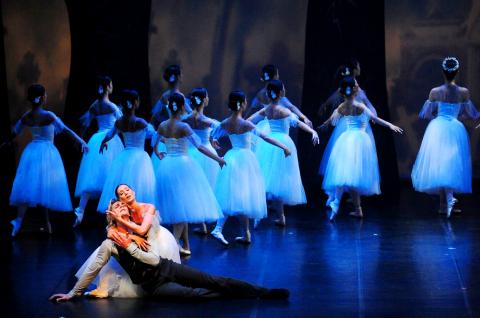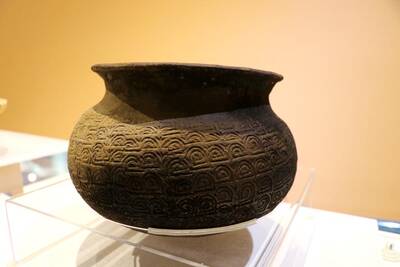Chamber Ballet Taipei’s (台北室內芭蕾舞團) production of Giselle at Metropolitan Hall (城市舞台) on Saturday night was a surprising delight.
Artistic director and choreographer Allen Yu (余能盛) did a good job of updating and transposing Act I of Giselle to a Taiwanese factory floor, helped along by a clever set design by Huang Jih-chun (黃日俊) and colorful costumes by Keith Lin Ping-hao (林秉豪), who also worked with him on last year’s production, The Door (門).
The show opens with a prologue to explain the connections between the main characters in Act I: Giselle, who loves Albrecht (the factory manager), and is loved by Hillarion, a coworker. Albrecht loves Giselle, but is engaged to the boss’ daughter. Each dancer has a spotlight solo, with Giselle and Albrecht blowing kisses at each other from the edge of their circle of light.

Photo Courtesy of Chamber Ballet Taipei
Giselle is clad simply in a 1950s mid-calf-length blue skirt, black leotard top and blue bandeau headband. The men are in slacks and shirts — and a vest for Albrecht, while his fiancee wears a red cocktail-length dress.
A set of windowed walls was then lowered to delineate Albrecht’s office and mark the start of Act I, with rows of fluorescent lights and a backdrop of an outsized, stylized factory floor featuring huge hubcaps and sprockets. It’s a minimal set, yet instantly conveys the storyline.
Instead of the usual sketch with Albrecht knocking on the door to Giselle’s cottage and then hiding from her, he knocks on the office windows while she is cleaning the room. There was no “he loves me, he loves me not” flower scene, but their flirting was capped with a touching pas de deux as Hillarion glowered from the doorway.
Julie Gardette was a beautiful Giselle. Her lines and batterie and entrechats were clean and she has a lovely penche. Her Act I mad scene was restrained, but you could see her heart breaking.
Michal Stipa was gorgeous as Albrecht. The Czech was born to play the prince in classical romantic ballets — tall, stately, great lines, assured partnering and strong lifts. He made the two straight-over-the-head lifts in Act II look like he was just stretching — they were just lovely.
Alexandre Katsapov as Hillarion was more Marlon Brando as Stanley Kowalski in A Streetcar Named Desire than the usual besotted lover of traditional Giselles, but he’s a fine dancer and actor.
The transposition to the factory floor didn’t work so well when it came time to explain why all the workers (men in slacks and shirts, women in 1950s full skirts, shirts and headscarves) would suddenly start dancing (in traditional versions it’s a wine harvest party). The acting was a bit hammy, with the factory director coming in (preceded by an enormous pillow-stuffed stomach) and money being flashed, but watching classical ballet always requires a suspension of belief. It was a bit over the top, but Yu said he was striving for a Taiwanese soap opera quality — and he certainly achieved that.
It was also a bit jarring to jump from a Taiwanese factory to Act II’s forest glen, with an old church and graveyard visible in the distance and the graves of Giselle and Myrtha, queen of the Wilis, on stage. The lighting was too bright for a nighttime encounter with the spirits — Hillarion hardly needed the lamp he carried to light his way through the forest — though the faux marbling of Giselle’s cross and tomb was a nice nod to Taiwan’s marble industry.
Having seen Yu’s annual summer productions for the past five years, I worried about the corps’ ability to handle Act II and the Wilis’ traveling voyages. The women acquitted themselves admirably, however, with just a few wobbles. Liao Yi-hsuan (廖奕琁) as Myrtha got off to a rocky start; her jetes looked hesitant and she landed heavily, but appeared to gain confidence as the act progressed. Yu said after the show that Liao was nursing an ankle injury.
One of the more visually impressive movements that Yu added was having the Wilis form two lines across the width of the stage, hands and arms crossed over their chests, and advance toward the audience as a desperate Hillarion scrabbled on his rear end to get out of their way. It was a nice, nightmarish touch.
The company will perform on Wednesday in Greater Taichung and Saturday and Sunday in Greater Tainan, and hopefully this is one production that Yu will stage in Taipei again. It is too good to just live in memories.

Sept. 1 to Sept. 7 In 1899, Kozaburo Hirai became the first documented Japanese to wed a Taiwanese under colonial rule. The soldier was partly motivated by the government’s policy of assimilating the Taiwanese population through intermarriage. While his friends and family disapproved and even mocked him, the marriage endured. By 1930, when his story appeared in Tales of Virtuous Deeds in Taiwan, Hirai had settled in his wife’s rural Changhua hometown, farming the land and integrating into local society. Similarly, Aiko Fujii, who married into the prominent Wufeng Lin Family (霧峰林家) in 1927, quickly learned Hoklo (commonly known as Taiwanese) and

The low voter turnout for the referendum on Aug. 23 shows that many Taiwanese are apathetic about nuclear energy, but there are long-term energy stakes involved that the public needs to grasp Taiwan faces an energy trilemma: soaring AI-driven demand, pressure to cut carbon and reliance on fragile fuel imports. But the nuclear referendum on Aug. 23 showed how little this registered with voters, many of whom neither see the long game nor grasp the stakes. Volunteer referendum worker Vivian Chen (陳薇安) put it bluntly: “I’ve seen many people asking what they’re voting for when they arrive to vote. They cast their vote without even doing any research.” Imagine Taiwanese voters invited to a poker table. The bet looked simple — yes or no — yet most never showed. More than two-thirds of those

In the run-up to the referendum on re-opening Pingtung County’s Ma-anshan Nuclear Power Plant last month, the media inundated us with explainers. A favorite factoid of the international media, endlessly recycled, was that Taiwan has no energy reserves for a blockade, thus necessitating re-opening the nuclear plants. As presented by the Chinese-language CommonWealth Magazine, it runs: “According to the US Department of Commerce International Trade Administration, 97.73 percent of Taiwan’s energy is imported, and estimates are that Taiwan has only 11 days of reserves available in the event of a blockade.” This factoid is not an outright lie — that

The People’s Republic of China (PRC) yesterday paraded its military hardware in an effort to impress its own population, intimidate its enemies and rewrite history. As always, this was paced by a blizzard of articles and commentaries in the media, a reminder that Beijing’s lies must be accompanied by a bodyguard of lies. A typical example is this piece by Zheng Wang (汪錚) of Seton Hall in the Diplomat. “In Taiwan, 2025 also marks 80 years since the island’s return to China at the end of the war — a historical milestone largely omitted in official commemorations.” The reason for its